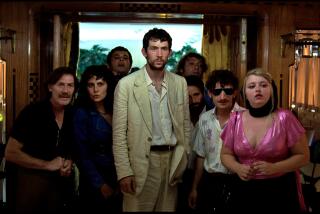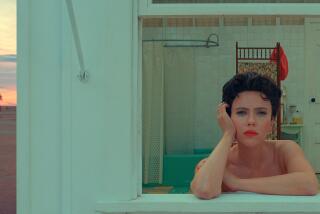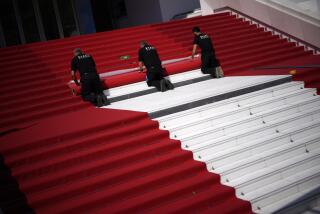‘Comrades’ and ‘Blow by Blow’ in UCLA Karmitz Survey
- Share via
The UCLA Film Archives series “Marin Karmitz and MK2” focuses on one of France’s most prestigious producers and his company. A longtime political activist, the Romanian-born Karmitz began as a film maker, and his three-weekend retrospective opens with two films he directed himself: “Comrades” (1970), which screens Saturday at UCLA’s Melnitz Theater at 8 p.m., and “Blow for Blow” (1972), screening Sunday at 8 p.m.
Few film makers, even the most serious and challenging, deal with the central role of work in our lives. For this reason alone, “Comrades” and “Blow for Blow” are valuable and involving, although the second is the far more accomplished work.
Both deal with factory workers rebelling against harsh and exploitative conditions. In the first, a pleasant young man, a high-school dropout (Jean-Paul Giquel), resists a life in the shipyards of his native St. Nazaire and eventually heads for Paris with the hope of finding office work, only to end up on a factory assembly line.
Karmitz has a vital, easy style and a fine sense of image and tempo, all of which makes it lamentable that in his film’s final half-hour he lapses into long-winded preachiness involving his hero’s political indoctrination. We are even treated to a tedious documentary on how a group of Argentinian workers have gone about organizing themselves. He ends the film with a salute to communism, endorsing its policy of the violent overthrow of government, a sentiment that he might find naive and passe today.
Although made only two years later, “Blow for Blow” is a better film in every way. He centers on a large group of women who feel they have no choice but to toil as garment workers in what is the only factory in their provincial town in central France. Supervised strictly by a severe-looking woman, the workers are not allowed to socialize in any way. The emphasis is entirely on output, so much so that it’s hard to believe that the film is set in the present--i.e., France in the early ‘70s--and not at the turn of the century or earlier.
Eventually, the workers revolt, occupying the factory and striking for higher pay, shorter hours and better working conditions.
The women, many of whom are actual workers, are an earthy, humorous, no-nonsense lot, and one of the film’s pleasures is watching them becoming acquainted with each other at last and achieving a lively sense of solidarity. “Blow for Blow” resists the didacticism of “Comrades” and it has a feminist spirit that makes it seem timelier than ever.
Both films, however, are notable in the way in which they point up the folly of greed. All the policies that tend to dehumanize the workers, exploiting them to the hilt, actually work against achieving productivity instead of ensuring it. In both film we witness human beings resisting becoming mere machines.
“Blow for Blow” will be followed by Yilmaz Guney’s “The Wall,” which is set in Turkey but was shot in France in 1982 for Karmitz’s MK2 production company. It was the first film the long-imprisoned and finally exiled Guney, considered Turkey’s greatest director, had been able to direct since 1974.
It is a beautifully crafted picture, in which a terrible prison becomes the symbol of present-day Turkey and which concentrates on the plight of some teen-age boys held there. As fine as it is, it really offers nothing new and therefore becomes punishing to experience. Tragically, Guney, who is best-known for that bleakest of masterpieces, “Yol,” gained his freedom and resumed directing only to die of stomach cancer in September, 1984, at 47.
Information: (213) 206-8013, 206-FILM.
The American Cinematheque’s “Temp’Theque” August offering at the Directors Guild is “Breaking the Boundaries: Eight Decades of Sex in the Cinema,” screening Friday, Saturday and Sunday. In addition to seven feature films--”So This Is Paris” (1926), “Red Dust” (1932), “The Outlaw” (1943), “. . . And God Created Woman” (1956), “Vixen” (1968), “Midnight Cowboy” (1969) and “Blue Velvet” (1986)--there will be excerpts from many other pictures. Information: (213) 461-9737.
More to Read
Only good movies
Get the Indie Focus newsletter, Mark Olsen's weekly guide to the world of cinema.
You may occasionally receive promotional content from the Los Angeles Times.









